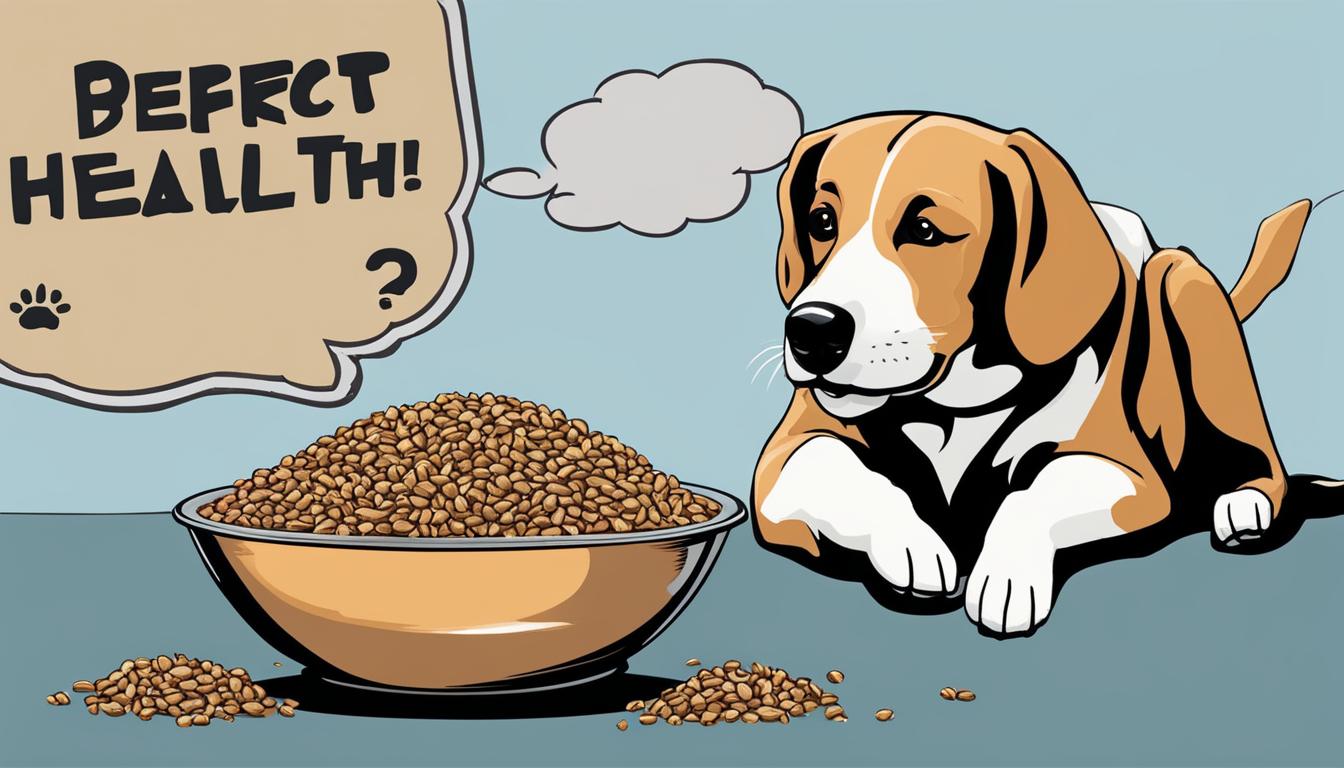Are you considering switching your dog to a grain-free diet? Grain-free dog food has become increasingly popular among pet owners, but there have been claims and concerns about its impact on canine health. It’s important to separate fact from fiction and make informed decisions about your furry friend’s nutrition.
Grain-free diets have been linked to a potential heart disease called dilated cardiomyopathy (DCM), prompting the FDA to investigate the matter. While research is still ongoing, it’s crucial for pet parents to understand the truth about grain-free dog diets and weigh the pros and cons.
Key Takeaways:
- Grain-free dog food has been associated with a possible link to dilated cardiomyopathy (DCM).
- Research suggests that certain ingredients used in grain-free diets, such as peas and lentils, may pose risks to heart health.
- It’s important to carefully evaluate the nutritional analysis and ingredients of grain-free dog food before making a decision.
- Consulting with a veterinarian can help you determine if a grain-free diet is suitable for your dog’s specific needs.
- Keep an eye out for signs of heart disease in dogs and seek veterinary attention if necessary.
The Background of Grain-Free Diets and DCM
Grain-free diets have become increasingly popular among dog owners, mirroring the rise of the gluten-free trend in human nutrition. These diets, which eliminate grains and replace them with ingredients like peas, lentils, and sweet potatoes, have gained momentum since around 2007. However, concerns have been raised regarding the potential impact of grain-free diets on canine heart health.
In 2017, veterinary cardiologists began observing a higher incidence of dilated cardiomyopathy (DCM) in dogs fed grain-free diets. DCM is a serious heart disease that can have detrimental effects on a dog’s overall health and well-being. As a result, the FDA initiated investigations and started collecting reports of diet-associated DCM cases among dogs.
When considering grain-free dog food options, it is crucial to carefully choose the right diet for your furry friend. While some dogs may benefit from grain-free diets due to specific allergies or sensitivities, it is important to weigh the potential risks associated with certain ingredients. Taking an informed approach and consulting with a veterinarian can help you make the best decision for your dog’s heart health.
| Ingredient | Percentage |
|---|---|
| Peas | 89% |
| Lentils | 62% |
| Chickpeas | 12% |
| Beans | 5% |
The table above illustrates the prevalence of specific ingredients in grain-free dog food associated with reported cases of DCM. As you can see, peas and lentils are the primary concerns, with a significant percentage of dogs diagnosed with DCM having consumed diets containing these ingredients.
The Link Between Grain-Free Diets, Ingredients, and DCM
Research has indicated that the absence of grains in a diet may not be the sole cause of dilated cardiomyopathy (DCM) in dogs. Instead, the focus is on the specific ingredients used as substitutes in grain-free diets. Pulses like peas, lentils, chickpeas, and beans have raised concerns in relation to DCM. Retrospective evaluations of reported cases revealed that 91% of dogs with DCM were on grain-free diets, with 89% including peas and 62% including lentils. These statistics highlight the potential risks associated with certain ingredients commonly found in grain-free dog food.
To better understand the health effects of grain-free diets, it is essential to consider the nutritional analysis of these foods. Pet parents should look for comprehensive information on protein, fat, carbohydrates, and micronutrients to ensure a balanced diet for their furry companions. Additionally, it is crucial to avoid specific ingredients that may be linked to DCM. While further research is needed, limiting the consumption of peas, lentils, and other pulses in grain-free dog food could be a proactive step in safeguarding your dog’s heart health.
When evaluating the ingredients in grain-free dog food, it is important to be aware of potential risks. Ingredients like peas should raise concern if they are listed in the top 10 ingredients, as this suggests a higher concentration in the product. Pet parents should exercise caution when choosing diets that contain limited or rarely used ingredients. Consulting with a veterinarian can provide valuable insights into choosing the right dog food, especially if your furry friend has allergies or if you have concerns about DCM risk associated with grain-free diets.
| Ingredients to Avoid in Grain-Free Dog Food | Percentage of Dogs with DCM |
|---|---|
| Peas | 89% |
| Lentils | 62% |
| Chickpeas | – |
| Beans | – |
Factors to Consider When Choosing Dog Food
When it comes to choosing the right grain-free dog food, there are several factors that you should take into consideration. It’s important to look beyond the marketing claims and carefully read the ingredient list to ensure you’re making the best choice for your furry friend’s health and nutrition.
One factor to consider is the presence of certain ingredients, such as peas. If peas are listed in the top 10 ingredients, it may be cause for concern. Research has indicated that peas, along with other pulses like lentils, chickpeas, and beans, may be linked to an increased risk of dilated cardiomyopathy (DCM), a heart disease in dogs. Therefore, it’s advisable to be cautious of diets that include these ingredients in high amounts.
Another important factor to consider is your dog’s specific needs, especially if they have allergies. While grain-free diets may be beneficial for dogs with certain allergies, it’s crucial to consult with a veterinarian to ensure that the diet you choose meets all of your dog’s nutritional requirements. A veterinarian can help you determine whether a grain-free diet is the right choice for your dog, considering any potential risks or concerns about DCM.

The Signs and Detection of Heart Disease in Dogs
When it comes to the health of our beloved furry friends, early detection is key. Heart disease in dogs can be challenging to diagnose, as the signs may not always be obvious. However, by being observant and aware of certain symptoms, you can help identify potential heart issues in your dog.
Here are some signs of heart disease in dogs to look out for:
- Loss of appetite
- Coughing
- Swollen abdomen
- Weakness and lethargy
- Difficulty breathing
- Weak pulse
- Panting excessively
If you notice any of these symptoms in your dog, it is important to consult with a veterinarian for a proper diagnosis and treatment plan. Regular check-ups with a veterinarian can help catch any underlying heart issues early on.
Table: Signs of Heart Disease in Dogs
| Signs of Heart Disease |
|---|
| Loss of appetite |
| Coughing |
| Swollen abdomen |
| Weakness and lethargy |
| Difficulty breathing |
| Weak pulse |
| Panting excessively |
Detecting heart disease in its early stages can significantly improve the prognosis for your dog. By staying vigilant and recognizing the signs, you can ensure your furry companion gets the necessary care and attention they need for a healthy heart.

Conclusion
So, are grain-free diets better for dogs? While there is ongoing research, it’s important to evaluate the nutritional analysis and ingredients of grain-free dog food. The link between grain-free diets and dilated cardiomyopathy (DCM) suggests that certain ingredients used as substitutes for grains may pose risks to heart health.
However, it’s essential to consider your dog’s specific needs. If your furry friend has allergies, a grain-free diet might be a suitable option. Yet, it’s crucial to consult with a veterinarian to ensure the right nutritional balance. They can help you evaluate the risks and benefits of grain-free dog food based on your dog’s individual health requirements.
Remember, making informed decisions about your dog’s nutrition is key to their overall well-being. So take the time to carefully choose their food, read the ingredient list, and pay attention to any potential risks associated with grain-free diets. Your furry friend deserves the very best, and by evaluating grain-free dog nutrition, you can ensure they are getting the right diet for their optimal health.
FAQ
What is the potential link between grain-free diets and Dilated Cardiomyopathy (DCM)?
The FDA has investigated a potential link between grain-free diets and DCM, a heart disease. Ongoing research suggests that certain ingredients, such as peas and lentils, used in grain-free dog food may pose risks to heart health.
Should I be concerned about feeding my dog grain-free food?
While there is ongoing research, it is important to carefully choose grain-free dog food and consider the potential risks for your dog’s heart health. Consulting with a veterinarian can help in making informed decisions about your dog’s diet.
Are all grain-free dog foods potentially harmful?
Not all grain-free dog foods are potentially harmful. It is important to carefully read the ingredient list and nutritional analysis. Consulting with a veterinarian can help determine the right food for your dog’s individual needs.
What are the signs of heart disease in dogs?
Signs of heart disease in dogs can include loss of appetite, coughing, swollen abdomen, weakness and lethargy, difficulty breathing, weak pulse, and panting. Regular check-ups with a veterinarian are crucial for early detection and intervention.
Can grain-free diets be beneficial for dogs with allergies?
Grain-free diets may be beneficial for dogs with specific allergies. However, it is important to carefully evaluate the nutritional analysis and ingredients of these diets and consult with a veterinarian.





